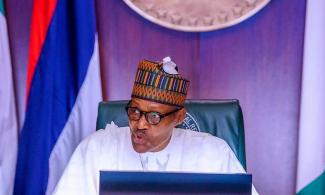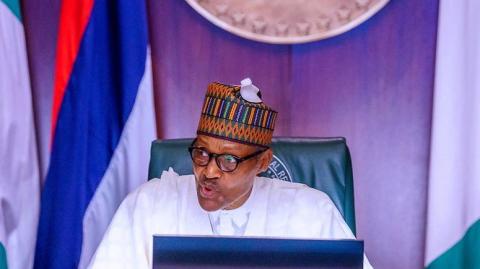
This is 124 per cent more than the appropriation given to the MDA’s within the period.
The Nigerian Government paid the office of the National Security Adviser, the Presidency, the Federal Ministry of Interior and the Federal Ministry of Water Resources N60.37bn more than it allocated to them in the 2016 and 2018 fiscal years.
This is 124 per cent more than the appropriation given to the MDA’s within the period.
Civic Media Lab discovered that the Ministry of Interior benefited more from the largesse, collecting N33.24bn from the pot of extra cash.
ONSA was over N10bn distant in second, with an added cash to spend of N20.44bn, the presidency was an estimated N15bn behind with a spending top-up of N5.80bn, while the Ministry of Water Resources was boosted with N462.67m.
On May 6, 2016, and June 20 2018, President Muhammadu Buhari passed a law ordering that ONSA be given a capital budget of N78.74bn, the presidency be allocated N50.78bn and Water Resources Ministry be granted N46.08bn.

In the 2018 financial year, the President asked that the Federal Ministry of Interior be credited with N75.09bn to meet its developmental plans.
Data collected from the Office of the Accountant-General of the Federation and sighted in the Budget Implementation Report published by the Budget Office, said as at May 5, 2017, and June 19 2019, ONSA had been credited with N99.18bn, the presidency was given an aggregate sum of N56.55bn and water resources was awarded N46.54bn.
The biggest beneficiary, the Ministry of Interior, had N108.34bn doled out to it.
2016 Record
The President approved the sum of N32.08bn for the office of the National Security adviser, which houses the spending of the DSS, the National Intelligence Agency and several other security apparatus.
At the end of the spending cycle, N33.21bn had been released into the coffers of the office.
This is N1.13bn or 103.5 per cent more than what the president approved.
The agencies in ONSA were able to spend all of the money approved, meaning the funds were released to them in time and no change was left over.
In the same budgeting cycle, the presidency was authorised to draw down on N23.04bn.
When the year had run its course, N27.94bn or 121 per cent of approved funds had been sent to all agencies in this parastatal.
It was not fortunate enough to spend all of it though. N2.13bn had to be returned to the revenue account because it was only able to spend N25.13bn, which is 109.2 per cent more than it should have been able to spend.
Within this year as well, the ministry of water resources was backed by law to spend N46.08bn.
When the year reached May 5 2017, the ministry had been given N46.54bn, N462.67m or 101 per cent more than it was meant to disburse.
In contrast to these agencies which were able to spend leisurely, key ministries like transport, power, works and housing; science and technology, health, education, etc, had to make varying degrees of cuts to their developmental plans for the year.
The Federal capital Authority was given less than half of the money it was supposed to develop Abuja with.
2018 record
2017 was a fair game for everyone. The Federal Government was too cash-trapped to give any MDA all it promised.
In 2018 though, the favoured siblings, ONSA and the presidency were given more than their allotted share of the country’s sparse development funds.
The Federal Ministry of Interior was more favoured than the other two, however.
In the appropriation act which was signed in June, DSS and its sister agencies were promised N46.66bn.
The executive graciously overextended itself to keep its word, giving ONSA N65.96bn, 141.4 per cent more than it vowed it would give.
The money was also released timely enough to ensure only N18,495 was returned.
ONSA had an extra N19.30bn to spend, when the Ministry of Power, Works and Housing had less than 50 per cent of its capital funds available.
In this year, the President’s parastatal was allocated N27.80bn.
Being the domain of the seat of power, it was given an extra N825.27m more.
Unfortunately, funds were not released early enough, making the department spend N20.56bn of the N28.560bn it received.
The presidency was mandated to return N7.22bn into the federation account.
The biggest winner, the Ministry of Interior, was assigned N75.09bn by the President during this budgeting calendar.
The large ministry was nonetheless credited with N108.34bn or 44.23 per cent more than it should have been given.
The timing of the disbursement to the parastatal meant it was not able to spend all of the additional N33.24bn sent to it. N14.87bn was returned to the consolidated revenue fund because the agencies in the ministry shared N93.47bn.
The Interior Ministry had leftover returns, while the Ministry of Industry, Trade and Investment received less than N50bn from an allocation of N81bn.
What is the explanation?
Former Head of Research at BudgIt, Samuel Atiku, said the extra funds came from the service-wide vote, an envelope of over N1trn housed in the then Ministry of Budget and National Planning.
“The budget is divided into two,” he explained. “There are ones that are going directly into the Ministries Departments and Agencies. Then there is what you call service-wide vote and capital supplementation.”
“For budgeting reasons, they do not tell you the MDA that will be responsible for spending money under capital supplementation or service-wide vote. During implementation, MDA’s will typically report funds that were appropriated under service wide vote or capital supplementation as if it was normal budgetary allocation.”
IN 2016, the appropriation plan of the budget and National Planning Ministry showed that N402.54bn of capital funding was embedded in the service-wide vote, out of a total package of N1.14trn.
Many of the line items listed as capital projects in the SWV, were MDA specific.
N4bn was awarded for capital development of the National Institute of Legal Studies.
Another N1bn was given for the National Assembly clinic. Yet, the National Assembly has its budget, which is a statutory transfer.
N2bn was given for the financing of the implementation of Nigeria’s nuclear power programme, money which could have been simply slotted into the budget of the National Atomic Energy Commission in the Presidency or the nuclear regulatory agency in the Ministry of Petroleum Resources.
Another N3bn was given to the Global Alliance For Vaccine Initiative; it could have been put in the health ministry and a N1bn matching grant for the safe school initiative programme that could have been part of the Education Ministry’s appropriation was also placed here.
Since both ministries did not receive full appropriation in 2016, it is a point of investigation to know if these monies were released.
As Atiku explained, the SWV is filled with projects that have unknown implementing agencies.
“It clearly shows that there is a difference between the Nigerian budgeting process that we run and the accounting process that we run as well,” Mr Atiku said.
This disparity was made more glaring in the 2018 budget. N55.15bn was budgeted as provision for the implementation of the National Health care Act, under the capital projects of the SWV.
The Health Ministry spent 53bn in this budgeting calendar. It was allocated N86.50bn but N63.42bn was released.
An officer from the Budget Office affirmed what Samuel Atiku said but could not give any specifics on how funds in the SWV are disbursed.
The officer said, “Some aspects of the service-wide vote are specific for certain agencies but there are some that are for general purpose.”
Carving out line items that are MDA specific in their intent, appears to be aimed at making the government’s spending plan opaque.
Provision for the payment of electricity charges is made in the spending plan of each agent.
Yet there is a lump sum of money for this same purpose in the 2018 SWV, giving an observer the impression that monies may be released for this intent in two different subheads.
The annual N100bn for constituency projects, which are scattered across many MDA’s, is also part of the SWV’s capital envelope.